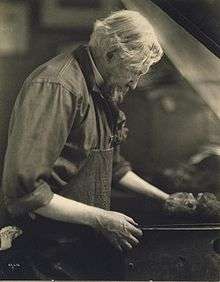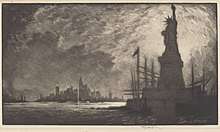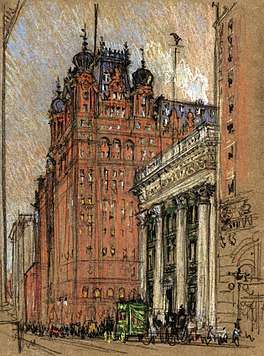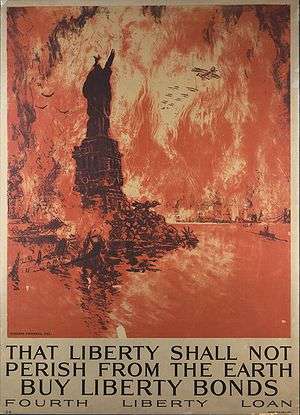Joseph Pennell
Joseph Pennell (July 4, 1857 – April 23, 1926) was an American artist and author.

Biography
Pennell was born in Philadelphia, and first studied there, but like his friend, James McNeill Whistler, he then made his home in London, and taught at Slade School of Art. He won a gold medal at the Exposition Universelle (1900), and 1904 Louisiana Purchase Exposition. He taught also at the Art Students League of New York.[1]
Works
Pennell made etchings that depicted landmarks in Philadelphia. His main distinction is as an original etcher and lithographer, and notably as an illustrator.
He wrote and illustrated an anti-Semitic travel book, The Jew at Home: Impressions of a Summer and Autumn Spent with Him (D. Appleton: New York, 1892), based on his travels in Europe.[2] He produced other books, many of them in collaboration with his wife, Elizabeth Robins Pennell. In 1886 he published Two Pilgrim's Progress, an illustrated book of his journey with Elizabeth from Florence to Rome, riding a heavy tricycle. The Pennells wrote a biography of Whistler in 1906, and, after some litigation with his executrix on the right to use his letters, the book was published in 1908.[3] In 1912, Pennell traveled to Panama to create lithographs of the Panama Canal, which was still under construction.[4]


Pennell visited San Francisco in March 1912, where he undertook a series of "municipal subjects". These were exhibited in December 1912 at "the prestigious gallery of Vickery, Atkins & Torrey". [5] It is possible that Pennell's visit inspired San Francisco printmakers Robert Harshe and Pedro Lemos, along with sculptor Ralph Stackpole and painter Gottardo Piazzoni, to found the California Society of Etchers in 1912, now the California Society of Printmakers.

Pennell designed the poster for the fourth Liberty Loans campaign of 1918. It showed the entrance to New York Harbor under aerial and naval bombardment, with the Statue of Liberty partly destroyed.[6]
Little Wakefield
In 1880 Joseph Pennell created Little Wakefield, an etching of the Little Wakefield estate.[7] The building is a home located on what is now South Campus of La Salle University, and is currently called St. Mutiens hall. This estate was built by Thomas Fisher in 1829 and was occupied by his families for generations; now it is the residence of the Christian Brothers of the University.[8] The etching depicts the house lived in by the second generation of Fishers. During World War I it was used as demonstration center for a local branch of the National League of Women's Service. Little Wakefield was also the location where Thomas R. Fisher ran the first knitting factory in America.[9]
Notes
- "Joseph Pennell, Noted Artist, Dead; Won High Honors as Etcher and Illustrator, Later Taught Art and Wrote Books" (PDF). New York Times. April 24, 1926. Retrieved January 27, 2012.
- Pennell, Joseph, The Jew at Home (NY, 1892), https://archive.org/details/cu31924028574352
- Chisholm 1911.
- Adams, Clinton (1983). American lithographers 1900-1960. Albuquerque: University of New Mexico. p. 19. ISBN 0826306608.
- Mary Millman and Dave Bohn, authors of The Master of Line: John W. Winkler, American Etcher , (Capra Press: Santa Barbara, CA, 1994).
- "Lest Liberty Perish from the Face of the Earth - Buy Bonds". World Digital Library. Retrieved 10 February 2013.
- "Pennell family papers, circa 1882-1951". dla.library.upenn.edu. Retrieved 2015-09-29.
- "Welcome to the La Salle Local History Web Page". www.lasalle.edu. Archived from the original on 2001-05-26. Retrieved 2015-09-29.
- "Welcome to the La Salle Local History Web Page". www.lasalle.edu. Archived from the original on 2015-10-26. Retrieved 2015-09-29.
References

External links
| Wikimedia Commons has media related to Joseph Pennell. |
- Works by Joseph Pennell at Project Gutenberg
- Works by Joseph Pennell at Faded Page (Canada)
- Works by or about Joseph Pennell at Internet Archive
- The Winterthur Library Overview of an archival collection on Joseph Pennell.
- Joseph and Elizabeth R. Pennell's papers at the Harry Ransom Center, University of Texas at Austin
- Joseph Pennell: an account by his wife, Elizabeth Robins Pennell, issued on the occasion of a memorial exhibition of his works, an exhibition catalog from The Metropolitan Museum of Art Libraries (fully available online as PDF)
- Finding aid for the Pennell family papers from the University of Pennsylvania Libraries

- . Collier's New Encyclopedia. 1921.
- . . 1914.
- "Pennell, Joseph". New International Encyclopedia. 1905.